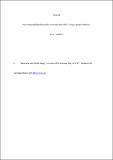Improving health professionals’ communication skills : a major global endeavour
Abstract
Growth and the phenomenon of Mainland China Mainland China is a country where the statistics about human activity and volume of services are breathtaking. To give a sense of the staggering nature of the size of this rapid economic expanding country is to realise the level of hospitals and clinics numbers rose to more than 320,000 with over 1.97 million doctors at the end of the last decade. The ratio of 15 doctors per 10,000 persons compares with the USA of 25 per 10,000 [1] http://www.chinatoday.com/data/data.htm. Changes within Chinese society are remarkable with the ability to communicate among citizens improving enormously with nearly half a billion cell-phone users and similar internet reach (2010 figures) and rapidly growing. There has been dramatic change in the organisation of health services in mainland China as shown by the strength of purpose to establish a public health insurance scheme for the large majority of the population. The challenges of organising health in this huge country is not without precendence of course as there are disparities between the cities and rural areas in accessibility to health care and the changes in treatable infectitious diseases to more chronic life-style illnesses such as diabetes and obesity. Hospital care in particular has seen some de-coupling from central public funding. Financial survival of these health care services is dependent on medical investigations and treatments. Accusations of over-treatment have been common threads of media coverage in the past few years in Chinese newpapers. Doctors and other health care workers feel under valued and under pressure from a public who have raised expectations. This wide scenario is common with others in the western world where complaints and litigation have inexorably risen to unprecedented levels. However the situation in China is exacerbated by the rapidity of changes within the health care system and their wider society. Additional factors are linked to a low base of formal training of communication skills within China’s Medical Schools. An example is the fact that this educational input focussing on health care interaction with the patient is often optional for undergraduate students. An important phenomenon with mainland China are the cultural changes that have occurred within society who have relied on the traditional speciality of medicine (known as Traditional Chinese Medicine, TCM), with a reliance on early identification of disease and a focused tailoring of intervention upon a detailed assessment. Typically this involves careful attention to person-centred variables, not least the belief structure of the individual seeking advice and intervention. The TCM approach has been advocated for combining with classical western medicine to attempt to get the best of both spheres of influence to cooperate towards a unified system. This has proved to be elusive, but the reasons for lack of integration are meaningful when attempting to explain the lack of attention to doctor patient interaction in a modern hospital and clinic settings.
Citation
Humphris , G M 2015 , ' Improving health professionals’ communication skills : a major global endeavour ' , Patient Education and Counseling , vol. 98 , no. 1 , pp. 1-2 . https://doi.org/10.1016/j.pec.2014.11.001
Publication
Patient Education and Counseling
Status
Peer reviewed
ISSN
0738-3991Type
Journal item
Collections
Items in the St Andrews Research Repository are protected by copyright, with all rights reserved, unless otherwise indicated.

